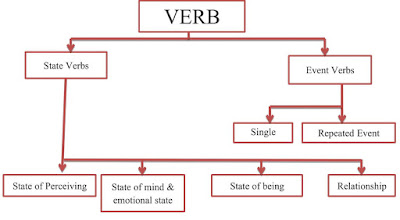Lesson no. 20 Verbs and Event Verbs in English
Lesson no. 20 Verbs and Event Verbs in English
In modern English
Grammar, Finite Verbs are classified in two broad categories. They are State
Verbs and Event Verbs.
Examples of State Verbs
State of Being
|
Verb |
Sentences |
|
Be
|
He
is a very brave boy. We
are Pakistani and they are Chines |
|
Remain
|
I
remain silent in such cases He
remains dumb all along |
State of Perceiving
|
Verb |
Sentences |
|
See |
I
se, you are a fool. |
|
Hear |
I
hear a buzzing sounds |
|
Feel |
I
feel tired. She feels ashamed of your behavior. |
|
Smell |
The
rose smells sweet. |
|
Taste
|
Honey
tastes sweet. |
State of mind & emotional state
|
Verb |
Sentences |
|
Love |
Everybody
loves his mother. |
|
Hate |
You
should not hate the poor. |
|
Like |
Ayesha
likes to wear white dress. |
|
Believe |
I
believe that you are telling the truth. |
|
Forget |
I
often forget his name. |
|
Appear |
The
dog appears to be mad. |
State of Relationship
|
Verb |
Sentences |
|
Have |
I
have a brother and a sister. |
|
Own |
Do
you own a motor bike? |
|
Owe |
You
owe your own house. |
|
Belong |
This
book belongs to me. |
|
Deserve
|
The
brave boy deserves praise. |
Examples of Event Verbs
Event Verb of single event and repeated events
|
Verb |
Sentences |
|
Buy |
I
bought an orange from the market. (single event) |
|
Buy
|
I
bought an orange from the market regularly (repeated
event) |
Difference between State Verbs and Event Verbs
State
Verbs are used only in Non- Progressive forms. But Event Verbs are used in both
Progressive and Non-Progressive.
Note-
Sometimes State Verbs may be used in Progressive forms, then the Verbs are
changed into Event Verbs and don`t remain the State Verbs.
Examples:
He
has a dog. (State Verb)
He
is having his lunch. (Event Verb)
I
forgot your name. (State Verb)
I
am forgetting names now a day. (Event Verb)
Honey
taste sweet. (State Verb)
He
is tasting honey. (Event Verb)
There
are some State Verbs which change their meaning when used in Progressive form.
Examples:
The
boy looks (appears) like his father.
The
boy is looking (becoming) more and more like his father.
You
look (appear) bright today.
She
is looking at (seeing) the moon.





Comments
Post a Comment